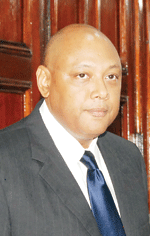Attorney General explains rationale behind new court challenge
ATTORNEY-GENERAL and Minister of Legal Affairs, Anil Nandlall, has said that the Opposition parties’ move to use their majority power by way of a vote to deny constitutional agencies financial resources to function is practically the same as constitutional sabotage.  The AG was at the time speaking in an interview with Editor in Chief of the National Communications Network (NCN), Michael Gordon, on Friday last.
The AG was at the time speaking in an interview with Editor in Chief of the National Communications Network (NCN), Michael Gordon, on Friday last.
Nandlall believes that one would expect the National Assembly would have discharged its responsibility in such a manner as to ensure that other constitutional agencies have the resources necessary to run their affairs. He, however, deemed the parliamentary opposition act as a “misuse of power”, and is clearly a contravention of the constitutional principle and configuration.
He made reference to the fact that neither the Parliament nor the Judiciary’s budget was cut, only the Executive’s.
Though hesitant to pronounce on the matter for which he has moved to the High Court for a judicial review of the Opposition’s move to cut the national budget, he explained that the proceeding currently pending in the court is a constitutional action which challenges the legality of the move by the National Assembly to reduce funds allocated by the Finance Minister for the fiscal year 2012.
He added that the National Assembly took upon itself the power and responsibility of proposing its own sums, which was passed by the one-seat majority Opposition.
Nandlall explained that the National Assembly fell into grave constitutional error, and abrogated several constitutional doctrines by its actions.
Further, he explained that Guyana is declared to be a democratic state; its constitution is built on the separation of powers. This doctrine divides constitutional responsibilities into three compartments: The Executive, Judiciary, and the Parliament (legislative).
Under the constitutional structure, each compartment is assigned specific and clearly defined functions. Further, in the discharge of their delineated functions, each enjoys functional autonomy.
“An exceptional amount of independence is imbued in the Judiciary, since it is the branch of government which is assigned the exclusive responsibility of reviewing the actions of others to ensure that they act reasonably and in conformity with the laws of the country. But, most importantly, that they act in the manner contemplated for and provided by the constitution which created them,” Nandlall asserted.
“Although the court has the overriding responsibility of being that forum to which you can complain about conduct and affairs in the Parliament, it can only go to a certain extent,” he pointed out.
The AG added that the jurisdiction of the court is to review the conduct of the Parliament to see that it functions in the way that the constitution intended it to function, and that is the jurisdiction which this action has invoked.
The constitution also created a series of offices, including the Cabinet, Defence Board, and the Guyana Elections Commission. These agencies are expected to be imbued and endowed with the necessary resources to discharge the functions which the constitution has ascribed to them.
The responsibility over the country’s finance has been given by the constitution to the Executive. As such, when the Finance Minister presents the national estimates of Guyana to the Parliament, he does so as a designate of the President (the head of the executive). The National Assembly, on the other hand, has a role to approve the estimates, he further pointed out.
“The National Assembly went way overboard when they did what they did in the last budget. They counter-proposed, and their counter-proposal was passed, so several constitutional wrongs, in my view, were committed. They have usurped the functions of the Executive…only the President’s designate can counter-propose. So, in essence, the National Assembly, as opposed to the Executive, passed the budget for those agencies,” the AG said.
Speaker of the National Assembly, Raphael Trotman, in a statement last week, expressed the view that the Executive’s move to challenge the cuts could lead to a constitutional crisis. However, Nandlall said that the crisis was generated in the National Assembly.
“The Executive’s move to the court is an attempt to find a solution to a constitutional crisis which emanated from the body over which the Speaker presides. All I am doing is going to another constitutional organ that has the power, responsibility, duty, independence and jurisdiction to remedy what is described as a constitutional crisis,” he clarified.
The matter was called in the Chambers of Chief Justice (AG) Ian Chang on June 7, but was adjourned to July 3; giving the Opposition three weeks in which to prepare submissions on why the Interim Order applied for should not be granted to the Government.
Budget cuts update…
SHARE THIS ARTICLE :
Facebook
Twitter
WhatsApp



.jpg)








